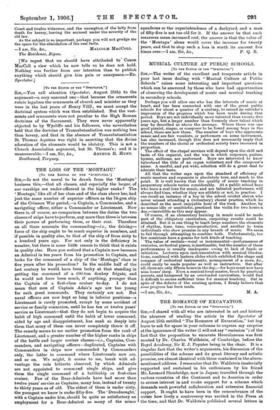THE LOSS OF THE MONTAGU.'
[To ME EDITOR OP TRH "SPECTATOR:1 Sin,—Is not the moral to be drawn from the 'Montagu' business this,—that all classes, and especially the larger, of our warships are under-officered in the higher ranks ? The
Montage,' like all of her class and of the class above her, had just the same number of superior offiCers as the 74-gun ship of the Crimean War period,,—a Captain, a Commander, and a navigating officer, either a Commander or Lieutenant. Now there is, of course, no comparison between the duties the two classes of ships have to perform, any more than there is between their powers of performing them, or their cost. Therefore on all these accounts the commanding--i.e., the driving— force of the ship ought to be much superior in numbers, and if possible in quality also, to that of the ship of from sixty to a hundred years ago. For not only is the deficiency in number, but there is some little reason to think that it exists in quality also. Have you noticed that a Captain now becomes an Admiral in ten years from his promotion to Captain, and looks for the command of a ship of the ' Montagu ' class in five years after his promotion ? In the middle half of the last century he would have been lucky at that standing in getting the command of a 600-ton donkey frigate, and he would not have been much, if anything, younger than the Captain of a first-class cruiser to-day. I do not mean that men of Captain Adair's age are too young for such great commands. They certainly are not. But naval officers are now kept so long in inferior positions—a Lieutenant is rarely promoted, except by some accident of service or family connexion, until he has ten or twelve years' service as Lieutenant—that they do not begin to acquire the habit of high command until the habit of lower command, aided by age and disappointment, has sunk so deeply into them that many of them can never completely throw, it off. The remedy seems to me earlier promotion from the rank of Lieutenant, and a greater number of the higher ranks in ships of the battle and larger cruiser classes—i.e., Captains, Com- manders, and navigating officers—duplicated, Captains with Commanders in ships now commanded by Commanders only, the latter in command where Lieutenants now are, and so on. We might, it seems to me, break with ad- vantage the rule hitherto observed, by which Admirals arc not appointed to command single ships, and give them the single command of a battleship or first-class cruiser. Few of the Rear-Admirals have had more than twelve years' service as Captains, many less, instead of twenty to thirty years as of old. The eldest of them is under sixty, the youngest we know is under fifty-five. The Dreadnought,' with a Captain under him, should be quite as satisfactory an employment for a Rear-Admiral as many of the minor squadrons or the superintendence of a dockyard, and a man of fifty-five is not too old for it. If the answer be that such measures mean increased cost, the answer is that the value of the Montagu' alone would cover the increase for twenty years, and that to stop such a loss is worth its amount five


































 Previous page
Previous page